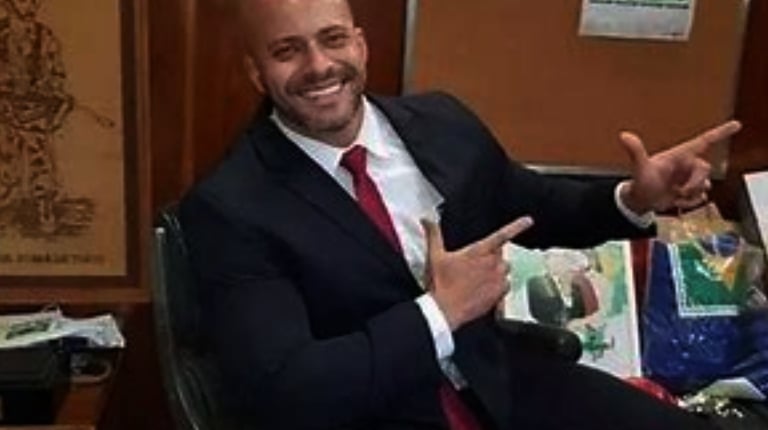Brazil's Shifting Sands of Free Speech: Judicial Actions and the Right's Wane
Brazil's Shifting Sands of Free Speech: Judicial Actions and the Right's Wane. Brazil's 1988 Federal Constitution, the bedrock of its democratic rule of law, firmly establishes the freedom of thought (Article 5, Clause IV) and the freedom of intellectual, artistic, scientific, and communicative expression, free from censorship or licensing (Article 5, Clause IX).
NEWS
Everton Faustino
5/21/20253 min read


While the former Press Law (Law No. 5,250/67) is largely repealed, its spirit of protecting free expression once held sway. However, a growing tide of lawsuits and convictions targeting authorities, politicians, artists, journalists, and YouTubers in Brazil is raising serious concerns about the very boundaries of this fundamental liberty.
High-profile cases, often stemming from criticism of public figures or political stances, have resulted in convictions for crimes like defamation, libel, and slander. While holding individuals accountable for harming one's honor is legitimate, the delicate balance between robust critique and defamatory attack appears increasingly precarious, with the scales tipping dangerously towards restricting free speech. Brazilian penal law (Articles 138-145) criminalizes these offenses against honor, serving as the basis for these convictions. Yet, the interpretation and application of these laws face scrutiny when used to silence dissenting voices and criticism of established power.
The advent of social media has revolutionized the information landscape in Brazil. The once near-absolute monopoly of traditional media has fractured, giving rise to a multitude of independent voices. Ordinary citizens, armed with smartphones and internet access, have become content producers and disseminators, breaking down the barriers of one-way communication. This new reality, while empowering for society, caught governments off guard, seemingly failing to grasp the decentralized and multifaceted dynamics of information in the digital age.
Faced with this shift, numerous attempts to "regulate" social media have emerged under the guise of combating disinformation and hate speech. However, many of these proposals are met with deep suspicion by free speech advocates, who interpret them as thinly veiled attempts at censorship and control of public debate. Imposing excessive liability on platforms for third-party content and creating bodies with broad moderation powers echo a regression to times when information was tightly controlled.
A particularly striking recent example is the arrest of federal congressman Daniel Silveira and the subsequent Supreme Federal Court (STF) decision to strip him of his parliamentary immunity. Silveira's detention followed the release of videos containing verbal attacks and threats against STF justices. The STF's decision ignited intense debate about the limits of parliamentary immunity and the extent of free speech, especially when it involves threats to democracy and its institutions. The STF based its decision on the interpretation that parliamentary immunity does not shield acts constituting flagrant crimes and threats to the democratic order.
Underlying this debate is the perception that some Brazilian politicians consider themselves above the law. Parliamentary immunity, enshrined in Article 53 of the Constitution and intended to protect the free exercise of their mandate, has sometimes been interpreted expansively, fostering a sense of impunity and fueling distrust in the impartiality of the judicial system when powerful figures are involved. This culture of privilege hinders the establishment of an equitable environment where the law applies to all, without distinction.
Against this complex backdrop, the question of hope for Brazil arises. The Brazilian right-wing, weakened by internal divisions and struggling to present a cohesive and inspiring alternative, appears to have lost its leading role in public discourse. Exacerbated polarization and a lack of strong leadership impede the construction of a consistent political agenda that firmly defends the principles of free expression and the limits of state power.
However, hope lies in the constant vigilance of civil society, the work of human rights organizations, and the resilience of journalists, artists, and influencers who continue to exercise their freedom of expression, even under the threat of judicial retaliation. Raising awareness about the importance of free speech as a fundamental pillar of democracy and pushing for legal reforms that unequivocally protect this right are pathways to reversing this worrying trend.
Brazil urgently needs to navigate the turbulent waters of the digital age, understanding that the solution to informational challenges lies not in censorship or control, but in strengthening media literacy, encouraging pluralistic debate, and guaranteeing a free and responsible online environment. The right's current weakness cannot equate to the absence of a strong voice defending democratic freedoms. Building a future where freedom of expression is truly protected and respected depends on the courage of all sectors of society to resist any attempt to silence voices and control the free flow of ideas.
Type the words below into the Unveiled Brazil search engine to learn more:
STF
FREEDOM
AMNESTY
JUSTICE
